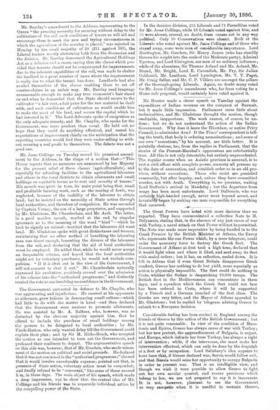Mr. Jesse Collings on Tuesday moved his promised amend- ment
to the Address, in the shape of a motion that—" This House regrets that no measures are announced by her Majesty for the present relief of these classes [agriculturalists], and especially for affording facilities to the agricultural labourers and others in the rural districts to obtain allotments and small holdings on equitable terms as to rent and security of tenure." His speech was quiet in tone, its main point being that small and profitable farming work, such as the rearing of fowls, was neglected, because of the inability of the labourer to obtain land.; but he insisted on the necessity of State action through local authorities, and therefore of compulsion. He was seconded by Captain Verney, the son of a large proprietor, and supported by Mr. Gladstone, Mr. Chamberlain, and Mr. Arch. The latter, in a good maiden speech, marked at the end by singular ignorance as to the meaning of the word "hind "—which he took to signify an animal—testified that the labourers did want land. Mr. Gladstone spoke with great distinctness and fervour, maintaining that no other method of benefiting the labouring man was diteot enough, lamenting the divorce of the labourers from the soil, and declaring that the aid of local authorities must be employed. He added that, while he would never accept an inequitable scheme, and hoped that the local authorities might act by voluntary purchases, he would not exclude com- pulsion. "if it is shut out in the view of the Government, I will not consent to shut it out." Mr. Chamberlain naturally expressed his exultation, positively crowed over the admission of his scheme into the "authorised programme," and distinctly treated the vote as one involving no confidence in the Government.


































 Previous page
Previous page